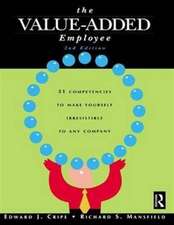The Foreman (RLE: Organizations): Aspects of Task and Structure: Routledge Library Editions: Organizations
Autor David Dunkerleyen Limba Engleză Paperback – 20 mai 2016
| Toate formatele și edițiile | Preț | Express |
|---|---|---|
| Paperback (1) | 299.52 lei 43-57 zile | |
| Taylor & Francis – 20 mai 2016 | 299.52 lei 43-57 zile | |
| Hardback (1) | 765.77 lei 43-57 zile | |
| Taylor & Francis – 20 mar 2013 | 765.77 lei 43-57 zile |
Din seria Routledge Library Editions: Organizations
-
 Preț: 349.15 lei
Preț: 349.15 lei - 18%
 Preț: 782.62 lei
Preț: 782.62 lei -
 Preț: 416.22 lei
Preț: 416.22 lei -
 Preț: 436.14 lei
Preț: 436.14 lei -
 Preț: 416.22 lei
Preț: 416.22 lei - 13%
 Preț: 295.74 lei
Preț: 295.74 lei - 16%
 Preț: 130.21 lei
Preț: 130.21 lei - 18%
 Preț: 1173.97 lei
Preț: 1173.97 lei - 18%
 Preț: 778.82 lei
Preț: 778.82 lei -
 Preț: 416.22 lei
Preț: 416.22 lei - 18%
 Preț: 1004.24 lei
Preț: 1004.24 lei -
 Preț: 416.22 lei
Preț: 416.22 lei - 13%
 Preț: 297.62 lei
Preț: 297.62 lei - 12%
 Preț: 299.52 lei
Preț: 299.52 lei - 12%
 Preț: 299.52 lei
Preț: 299.52 lei - 14%
 Preț: 299.52 lei
Preț: 299.52 lei - 12%
 Preț: 299.52 lei
Preț: 299.52 lei -
 Preț: 416.22 lei
Preț: 416.22 lei - 18%
 Preț: 782.62 lei
Preț: 782.62 lei - 18%
 Preț: 1357.51 lei
Preț: 1357.51 lei - 24%
 Preț: 278.92 lei
Preț: 278.92 lei -
 Preț: 198.19 lei
Preț: 198.19 lei -
 Preț: 416.22 lei
Preț: 416.22 lei - 34%
 Preț: 623.71 lei
Preț: 623.71 lei -
 Preț: 416.22 lei
Preț: 416.22 lei - 34%
 Preț: 764.34 lei
Preț: 764.34 lei - 34%
 Preț: 825.06 lei
Preț: 825.06 lei - 18%
 Preț: 887.29 lei
Preț: 887.29 lei - 34%
 Preț: 825.25 lei
Preț: 825.25 lei - 33%
 Preț: 1608.44 lei
Preț: 1608.44 lei - 33%
 Preț: 11175.09 lei
Preț: 11175.09 lei
Preț: 299.52 lei
Preț vechi: 341.55 lei
-12% Nou
Puncte Express: 449
Preț estimativ în valută:
57.31€ • 59.100$ • 47.42£
57.31€ • 59.100$ • 47.42£
Carte tipărită la comandă
Livrare economică 07-21 aprilie
Preluare comenzi: 021 569.72.76
Specificații
ISBN-13: 9781138989269
ISBN-10: 1138989266
Pagini: 202
Dimensiuni: 156 x 234 mm
Greutate: 0.45 kg
Ediția:1
Editura: Taylor & Francis
Colecția Routledge
Seria Routledge Library Editions: Organizations
Locul publicării:Oxford, United Kingdom
ISBN-10: 1138989266
Pagini: 202
Dimensiuni: 156 x 234 mm
Greutate: 0.45 kg
Ediția:1
Editura: Taylor & Francis
Colecția Routledge
Seria Routledge Library Editions: Organizations
Locul publicării:Oxford, United Kingdom
Public țintă
General, Postgraduate, Professional, and UndergraduateCuprins
Preface. 1. Introduction. 2. The Theoretical Model. 3. Identifying and Defining the Foreman. 4. Foremen and the Organisational Sub-system. 5. The Foreman and the Group. 6. The Individual Characteristics of Foremen. 7. Implications and Conclusions. Bibliography. Index.
Notă biografică
Multivolume collection by leading authors in the field
Descriere
The foreman is usually regarded as a filter in a chain of command in industrial organizations. In this book, however, the author suggests that this view is not adequate, and he proposes instead a model of analysis which employs a systems perspective. The role of the foreman is seen in terms of the interaction of three sub-systems representing the organization, the group and the individual. The book is based on the work of researchers from many disciplines and employs a sociological framework to account for the peculiar strains, conflict and ambiguities associated with the foreman’s role.














